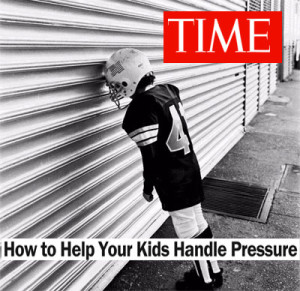Parenting is a process that can be fraught with fear and anxiety. In my daily work with parents, I often encounter thoughts such as, “Am I doing it right?”, “I just want my son to grow up not making the mistakes that I made”, and “I just want her to be happy?”. These are just of the few of the thoughts that are voiced; however, beneath the surface there are many other concerns. With the increased demands being placed on our youth in school and sports, our worry can make us forget our parenting objectives: to create well-adjusted, resilient and secure children.
It is important to take a long term (broader perspective) when we are thinking of child development. At times, our parent lens becomes fixed like a microscope, examining every small detail; however, we need to look at the skills we are trying to create from a broader lens. If we can change our focus and think flexibly, we can begin to model this same skill for our children. When done correctly, both parents and children will learn how to tolerate ambiguity in stressful situations.
 Recently, I read an article that discussed how parents can teach their child how to alleviate stress and pressure, How to Help Your Kids Handle Pressure. The author references Lynn Lyons, clinical social worker, who addresses the teachable way that parents can help their child adapt to the stressors of everyday life. Keep in mind how parents can adjust their discussion depending on the age and specific pressure faced by their child. Below are a few of the highlighted excerpts from the article.
Recently, I read an article that discussed how parents can teach their child how to alleviate stress and pressure, How to Help Your Kids Handle Pressure. The author references Lynn Lyons, clinical social worker, who addresses the teachable way that parents can help their child adapt to the stressors of everyday life. Keep in mind how parents can adjust their discussion depending on the age and specific pressure faced by their child. Below are a few of the highlighted excerpts from the article.
Parents can help them by starting conversations about the fact that life isn’t about “rigid pressure to do it this one way,” says Lyons. “Things are changeable, you can adapt, and problem solve, and manage what life throws at you.” Parents can start that process with elementary school kids by letting them know that some uncertainty in life is O.K.
My comment – This is a great example highlighting how to teach children to tolerate ambiguity and think flexibly. In elementary school, children place a great deal of self-worth on the result/outcome of an event.They tend to be concrete in their approach to a situation (win-loss, fair-unfair, etc.). We can begin to teach them coping strategies by generating alternative ways to solve a problem. We can also teach them how to separate their self-worth from the outcome. You can also point out what your child did correctly in the situation.
The central pressure in the lives of middle school kids is social. But Lyons says middle school kids are so “acutely aware of social ranking and status,” that it can be hard for parents to start direct conversations with them about the social pressures they face.
My comment – These are the hardest situations for parents to address with their child. What makes it even more difficult is the involvement with technology (texting and social media). Try to relate it to situation you experienced as child that was similar, de-emphasize the permanence of the social situation, emphasize your core values and the resolution of the social issue.
High school kids need to be supported in their autonomy, says Lyons. The most important skill to teach them here is how to tell the difference between what matters, and what doesn’t. And the best teacher, Lyons says, may be life itself.
My comment – We have all heard the expression, “I thought my parent didn’t know anything until I got older”. At this stage, parents need to shift their parenting style to a consultative role. We emphasize advisement of potential ways to handle situations as well as the outcome. Sometimes, stepping back and having your teenager deal with a situation is the best life lesson.
If you have noticed, we have moved from a structured and concrete parenting approach when our children are young to a more abstract and consultative parenting strategy as our child gets older. This is consistent with a developmental model of child development. Each stage involves instruction, albeit in a different manner. However, the best way to teach your child is to model it in your everyday actions. Even though you may not always model your actions perfectly on every occasion, try to remain consistent in your approach. That will yield the best results for you and your child in the long run.
John E. Macri, Ph.D. is a licensed psychologist who runs a private practice, New Jersey Clinical and Sport Psychology in Ridgewood, NJ. He has assisted numerous children, adolescents, and parents in educational, behavioral and athletic achievement. He is available for individual consultation and workshops. He can be reached at (201) 445-3306 or john@newjerseycsp.com.




